2014th BLOG POST
18th Book of 2022
Though I am in my
early 30s but I feel that I am mentally in the same zone as I was in my late
teen years. The number of challenges and anxiety I went through those years
have still stayed with me and I believe it will stay till the last breath.
Hence, whenever I find someone speaking or writing about their experiences of
11th-12th std where other students are giving their best
with complete focus and we are going through dilemma about what should be
chosen for the future, I just sit and listen to these people. I am someone who
failed 11th standard twice and couldn’t pass it at all. I finally
did my 12th privately without any college. Well, that’s the reason Ishita
Agarwal’s new book “Teen Machine” attracted me.
The book is
published by Rupa Publications in around 265-odd pages. The title of the book
itself says so much. It reflects how teenagers have been conditioned to be less
humane but more like machine – where they have to sit for competitive exams one
after another with an expectation of not failing even once in their life. For
parents, it is quite normal to make their child go through this process because
they wish a good future for them. Unfortunately, for children/students, this
becomes a traumatic and self-destructive process where they lose themselves on
daily basis in this ultra-competitive and machinery world. Ishita has tried to
reflect on what goes behind the Indian child’s brain who has to go through so
much in the age when they should also be chilling a bit and figuring out things
themselves.
Through the
character of Avani, author has ensured that we can relate to the pain and
struggle of a girl who has been good in her school days but finds this whole
environment and set-up of 11th std quite challenging and
out-of-the-world. She is unable to identify with the same classmates who were
with her until 10th std. Everyone’s stance has changed and she has
to adapt to this new culture where classmates are only talking about studies,
doubts, exams and results whereas she wants to gel with others on human level.
Ishita has given
significance to the fact how it hits you first when you realize you won’t be
going to school anymore but the coaching classes are going to be your new home.
She tells how even after the long-running coaching, students are expected to
invest minimum 6 hours of self-study daily. Even the group they chose needs to
be a study group among whom doubts and studies can be discussed. Author also
focuses on the hormonal changes that happens during this age when you start liking
someone and get infatuated. Though I am glad that author didn’t insert too much
love-angle and cheesy conversations in the story. She limited this angle quite intelligently
to not make this a chick-lit stuff.
How parents become
judgmental towards their children during this phase is nicely portrayed through
Avani as well as Avik’s character. I liked how Ishita also showed the behavioral
changes of both- mother and father where the loving one takes up a hunter well
as an aggressive parent becomes caring during this phase. Ishita focuses on how
academic results start showing up when a child removes all the negative
opinions, thoughts and inferiority complex away and only focuses on
self-improvement and stop lying to themselves about their investment in studies
and towards their goal.
The
characterizations done in this story is perfect as you could relate with each
of them. The depth shown with Avani’s character is also commendable as you get
to understand her internal thoughts as well as her external actions during any
scenario. The narration is simple which makes it easy for you to finish this
book within one or two sittings. I liked the climax of the book as it tells you
a lot about life in particular which is so true at any age. The only drawback
that I could sense while reading this book is keeping the character’s challenges
only towards academic. This is the age when children also get distracted by
several other things which becomes a hindrance towards studies – which I
believe should have been included – if not with protagonist, then with any
other character in the story. I felt the plot to be too straight-forward and linear.
Overall, this is a
book which needs to be read by children after their 9th std so that
they understand how to channelize their emotions to get the academic results as
well as maintaining mental peace. Also, this is as much effective for parents
in order to understand how to mould their child with love rather than
judgments. I give this book 3.75 stars out of 5.
Thanks!
WRITING BUDDHA




0 CoMMenTs !!! - U CaN aLSo CoMMenT !!!:
Post a Comment